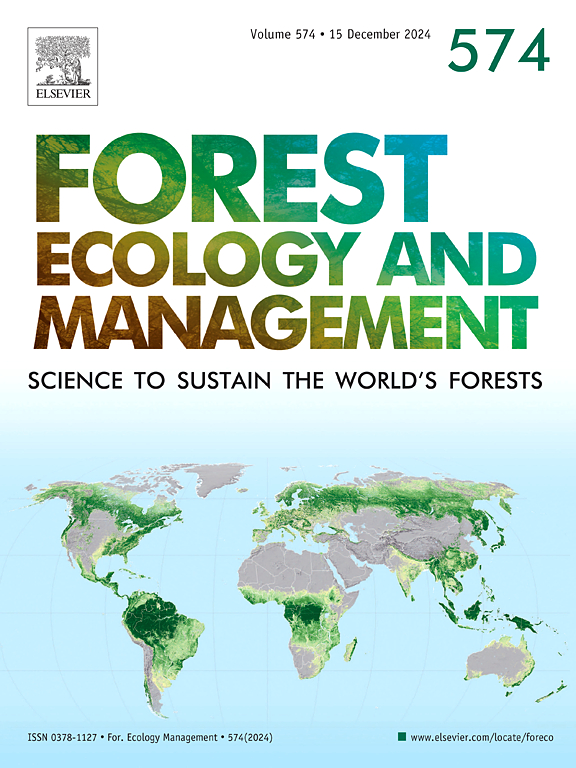Towards a common approach to defining forest management intensity
IF 3.7
2区 农林科学
Q1 FORESTRY
引用次数: 0
Abstract
Forests play a crucial role in regulating the global climate, preserving biodiversity and providing essential ecosystem services; however, in the context of global change and anthropogenic pressures, it becomes ever more important to understand, evaluate and harmonize human interventions in forest ecosystems. Therefore, a comprehensive assessment of forest management practices is essential for promoting the sustainability and resilience of these systems. To this end, this study proposes a new index for assessing forest management intensity (FMI), which classifies forest management schemes on the basis of their demands. The values of the index are expected to range from 0, representing no management, to 3, indicating high-intensity management. The index comprises three factors: the degree of extractive impact on the ecosystem, the financial resources required and the input required from forest managers. In addition to conceptualization of the index, this work also presents a case study in which different examples of management schemes are evaluated, and the results confirm that management schemes requiring higher input, greater care and higher productive capacity yield higher values of the index than alternatives with longer rotations or lower productivity. Moreover, multifunctional systems demand more management input than traditional production systems for the same species. Furthermore, the study highlights that even old-growth forests, while minimally managed, require some level of attention, as abandonment of forests is associated with zero-intensity management. In conclusion, the FMI proves to be a valuable tool for assessing and comparing forest management practices at multiple scales (regional, national, and European), while highlighting the need for harmonized indicators to support coherent and informed decision-making in forest policy and sustainability planning. It is also possible to use each factor independently to provide insights into optimizing management strategies, by characterizing the management practices applied, and as a useful guide to developing more sustainable forestry approaches.
制定确定森林管理强度的共同办法
森林在调节全球气候、保护生物多样性和提供基本生态系统服务方面发挥着至关重要的作用;然而,在全球变化和人为压力的背景下,理解、评价和协调人类对森林生态系统的干预变得越来越重要。因此,全面评估森林管理做法对于促进这些系统的可持续性和复原力至关重要。为此,本研究提出了一种新的森林经营强度评价指标,根据森林经营强度的需求对森林经营方案进行分类。该指数的取值范围从0(无管理)到3(高强度管理)。该指数包括三个因素:采掘对生态系统的影响程度、所需的财政资源和森林管理者所需的投入。除了对指数进行概念化之外,本工作还提出了一个案例研究,其中对不同的管理方案进行了评估,结果证实,需要更多投入、更多关注和更高生产能力的管理方案比轮换时间较长或生产率较低的管理方案产生更高的指数值。此外,对于同一品种,多功能系统比传统生产系统需要更多的管理投入。此外,该研究强调,即使是最低限度管理的原始森林也需要一定程度的关注,因为放弃森林与零强度管理有关。总之,FMI证明是在多个尺度(区域、国家和欧洲)评估和比较森林管理做法的宝贵工具,同时强调需要统一的指标,以支持在森林政策和可持续性规划方面作出一致和知情的决策。也可以单独利用每一个因素,通过描述所采用的管理做法的特点,对优化管理战略提供见解,并作为制定更可持续林业办法的有用指南。
本文章由计算机程序翻译,如有差异,请以英文原文为准。
求助全文
约1分钟内获得全文
求助全文
来源期刊

Forest Ecology and Management
农林科学-林学
CiteScore
7.50
自引率
10.80%
发文量
665
审稿时长
39 days
期刊介绍:
Forest Ecology and Management publishes scientific articles linking forest ecology with forest management, focusing on the application of biological, ecological and social knowledge to the management and conservation of plantations and natural forests. The scope of the journal includes all forest ecosystems of the world.
A peer-review process ensures the quality and international interest of the manuscripts accepted for publication. The journal encourages communication between scientists in disparate fields who share a common interest in ecology and forest management, bridging the gap between research workers and forest managers.
We encourage submission of papers that will have the strongest interest and value to the Journal''s international readership. Some key features of papers with strong interest include:
1. Clear connections between the ecology and management of forests;
2. Novel ideas or approaches to important challenges in forest ecology and management;
3. Studies that address a population of interest beyond the scale of single research sites, Three key points in the design of forest experiments, Forest Ecology and Management 255 (2008) 2022-2023);
4. Review Articles on timely, important topics. Authors are welcome to contact one of the editors to discuss the suitability of a potential review manuscript.
The Journal encourages proposals for special issues examining important areas of forest ecology and management. Potential guest editors should contact any of the Editors to begin discussions about topics, potential papers, and other details.
 求助内容:
求助内容: 应助结果提醒方式:
应助结果提醒方式:


